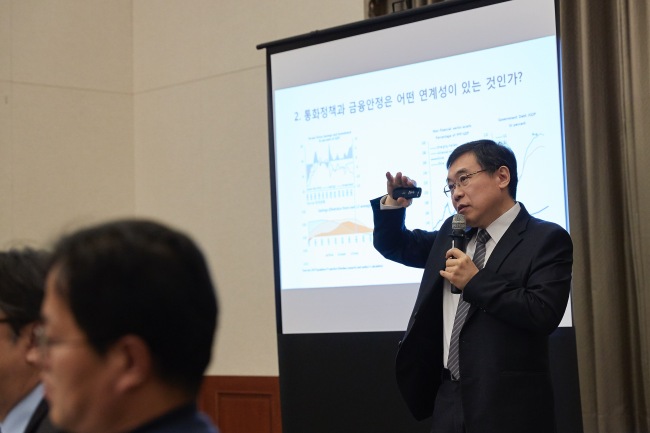‘Lack of savings limit monetary easing effect on consumption’
By Korea HeraldPublished : Feb. 1, 2017 - 17:10
A member of the Bank of Korea’s monetary policy committee said a shortage in Korea’s accumulated savings in the past decade seems to have limited the central bank’s current monetary easing effect on consumption.
“While we have to prepare for aging, it seems that our accumulated savings (since the 1997 Asian financial crisis) have been in shortage. This could be the reason why boosting consumption through monetary easing did not work normally as we expected,” Lee Il-houng, one of seven member of the BOK’s monetary policy committee, said in a rare press conference at the BOK’s head office in Seoul, Wednesday.
“While we have to prepare for aging, it seems that our accumulated savings (since the 1997 Asian financial crisis) have been in shortage. This could be the reason why boosting consumption through monetary easing did not work normally as we expected,” Lee Il-houng, one of seven member of the BOK’s monetary policy committee, said in a rare press conference at the BOK’s head office in Seoul, Wednesday.

Lee also said a financial debt growth without an income growth could threaten financial stability as was the case in the 2008 global financial crisis.
“As shown in the 2008 global financial crisis, financial instability often occurs when an expansionary monetary policy leads to financial debt growth only and does not lead to income growth.”
However, he did not make any comment on the central bank’s future monetary policy directions.
Lee said that even though Korea’s economic size, export volume and the financial market volume is similar to those of advanced nations, its financial openness is still at the stage of emerging markets.
Lee, former president of the state-run think tank Korea Institute for International Economic Policy, was appointed as the member of the central bank’s rate-decision body in April last year by President Park Geun-hye, after being recommended by BOK Governor Lee Ju-yeol.
The BOK has been gradually lowering the base rates from 2.25 percent in August, 2014 to 1.25 percent in June, 2016, in support of the economic growth. Since June last year, the rate has remained unchanged.
Emily Dabbs, economist at Moody’s Analytics, said in a report that the BOK is expected to keep the policy rate at a record low of 1.25 percent through 2017 before increasing capital outflows and rising inflation pressures prompt tightening in 2018.
By Kim Yoon-mi (yoonmi@heraldcorp.com)
-
Articles by Korea Herald





![[KH Explains] No more 'Michael' at Kakao Games](http://res.heraldm.com/phpwas/restmb_idxmake.php?idx=644&simg=/content/image/2024/04/28/20240428050183_0.jpg&u=20240428180321)













![[Herald Interview] Mistakes turn into blessings in street performance, director says](http://res.heraldm.com/phpwas/restmb_idxmake.php?idx=652&simg=/content/image/2024/04/28/20240428050150_0.jpg&u=20240428174656)
